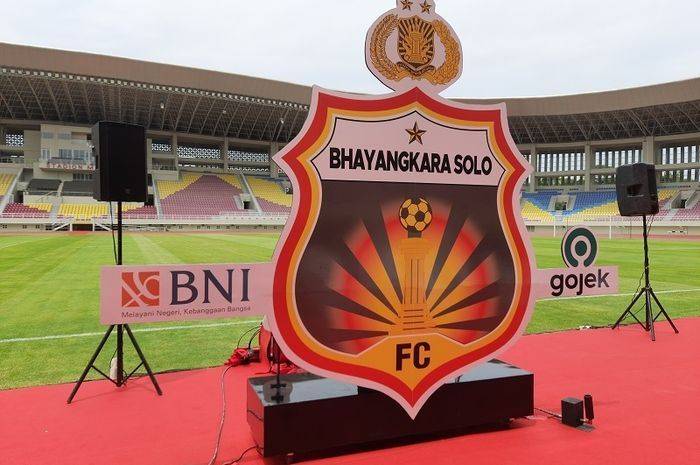
2017 Liga 1 Indonesia champions Bhayangkara FC has decided to up sticks yet again and relocate to a new city. Despite spending the past two years playing at their own stadium that is the PTIK Stadium in South Jakarta’s University of Police Science, Bhayangkara, who are backed by the Indonesian Police, has decided to move to the Central Java city of Solo during the ongoing suspension of the 2020 Liga 1 season, seeking to establish themselves as the city’s second club there. In an attempt to connect with the local supporters there, Bhayangkara subsequently rebrand themselves as Bhayangkara Solo FC.
Bhayangkara’s decision to move to Solo’s Manahan Stadium continues the city’s tradition of having second clubs that coexisted with the already well-established Persis Solo. Arseto FC, a former giant of Indonesian football during the 80s, was Solo’s initial second team from 1983, enjoying a period of success there before the resignation of President Soeharto in 1998 (whose son founded Arseto) forced the dissolution of the club.
Pelita Jaya filled in the void left by Arseto in 2000, assuming the name Pelita Solo, however the club, now known as Madura United, decided to move away from the city in 2002. Last but not least, Persijatim Jakarta Timur were relocated to Solo after being bought out by new investors in 2002, with the new owners moving the club from East Jakarta to the Manahan Stadium. However Persijatim’s tenure as Solo’s second club did not last long too, being taken over by a new set of owners in 2004 and relocating to Palembang in South Sumatra where they would become Sriwijaya FC.
Bhayangkara’s move to Solo was made official with an inauguration ceremony at the Manahan on Friday, which was attended by Football Federation of Indonesia (PSSI) executive member Haruna Soemitro, PT Liga Indonesia Baru (LIB) general director Akhmad Hadian Lukita, Arema FC general manager Ruddy Widodo, and PSSI vice-chairman Iwan Budianto.
“From this season onwards Bhayangkara FC will be known as Bhayangkara Solo FC,” said Bhayangkara chief operating officer Sumardji in an interview with Indonesian press during the ceremony, “Every element within the club’s organization will be moved here, from the home ground to the training ground, everything related to Bhayangkara will be based here in Solo.”
A huge contributing factor behind Bhayangkara’s decision to move to Solo was the sparse attendance that the team got when they were still based in South Jakarta. Despite owning their own stadium, Bhayangkara were unable to draft in many people to support them, as the people of Jakarta generally support the already well-established Persija Jakarta. Even Liga 3 side Persitara Jakarta Utara were able to garner more support than Bhayangkara, whose home games at the 3000-capacity PTIK Stadium had an average attendance of 1051 people in the 2019 season, most of them from opposition supporters.
Bhayangkara’s nature as an institution club played a huge role in their overall alienation, coupled with their controversial past of being a “cheap knockoff” of Persebaya Surabaya that was established when the Bajul Ijo decided to play in the breakaway Liga Primer Indonesia (LPI) in 2011. A similar problem was also faced by fellow institution club PS TIRA, who were backed by the Indonesian Army. However, their merger with Persikabo Kabupaten Bogor and subsequent rebrand into TIRA-Persikabo and Persikabo 1973 has slowly won them support from Persikabo’s already established groups of supporters.
It is hoped that the addition of “Solo” within their name would enable Bhayangkara to win over the support of the city’s people, however they would have to face competition from Persis and their fanatical Pasoepati supporters group. The members of Pasoepati themselves has a mixed reaction towards Bhayangkara’s presence within their territory.
“The presence of a new club should be welcomed with open arms as they will make football within Solo much more vibrant,” said Pasoepati founder Mayor Haristanto on Friday, “Especially with the fact that they’re playing in the top-flight. The people of Solo will have some quality football to look forward to. However personally I have some reservations about their decision to use the name Solo within their identity, as Solo belongs to Persis, and Persis belongs to Solo. I don’t mind them using the Manahan, but don’t change their name to Bhayangkara Solo. I think they will receive a more positive response if they stuck to the Bhayangkara FC name.”
Sardi, another Pasoepati member, had this to say, “To be honest the friends within the grassroots community are quite surprised by this move. Why did Bhayangkara Solo FC suddenly showed up in our doorstep? I don’t mind having them around but please don’t change their name like that. What if Persis will no longer be prioritized when the two teams had to use the Manahan within short notice?”
Pasoepati president Aulia Haryo Rio has decided to take a more diplomatic approach towards this issue, “Personally I have no problems if Bhayangkara decides to use Solo in their name, it’s up to them. What’s most important is us Pasoepati will always stick alongside Persis through thick and thin. I hope Bhayangkara’s presence within Solo would motivate Persis and other figures within Solo football to be better for the future.”
Bhayangkara’s management have acted quickly in their attempts of building a localized supporters base within Solo, giving out free groceries to the locals and vowing to help improve Solo football by recruiting and utilizing local young talent within their team. On the legal aspect, Bhayangkara are also negotiating with the Central Java branch of PSSI to have themselves registered there. Despite previously being based within the Greater Jakarta (Jabodetabek) region, Bhayangkara were registered with the East Java branch of PSSI due to their past as “Persebaya Divisi Utama.”

